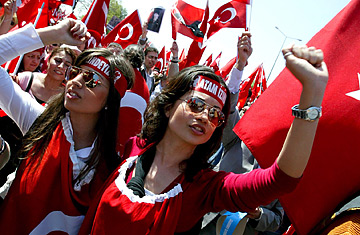
Turkish secularists protest against the Development Party's (AKP) presidential candidate, Abdullah Gul, during a rally in Istanbul, Turkey April 29, 2007.
"Count us!" they chorused, nearly 1 million of them, the silent middle class on a very noisy day out. Many were novice demonstrators. "This is the first time I've ever been to a rally," said Mine Okcuoglu, a 29-year-old banker, attending with her mom. "I felt that I had to do something because the government is taking Turkey in a direction I strongly object to."
The breaking point has come over Prime Minister Recep Tayyip Erdogan's insistence on nominating his number two, Abdullah Gul, as Turkey's next President. The presidency is a largely symbolic role, but he wields important veto power. With Gul as President, and the Justice and Development Party (AKP) a comfortable majority in parliament, secular Turks fear "it would be the beginning of the end for Turkey as we know it," says commentator Metin Munir. Their concern is that the AKP harbors a secret Islamist agenda, and that without the appropriate checks on their power, they will seek to adopt Sharia-based laws.
Since taking power in 2002, the AKP has tried to distance itself from some of the Islamist rhetoric of its precursor party, and in government, it has done more for Turkey's European Union membership bid than any party before it. But its record is patchy. It also tried to pass a law that would criminalize adultery, and to appoint an Islamic banker as head of the central bank. Every day the papers carry a report of an AKP official in some town doing something outlandish — men and women being segregated at a municipal event, a swimming pool banning women from entering with their young sons (because they are male), bars being closed down to discourage alcohol consumption.
"We are afraid," says Aygul, a teacher. "Today's rally is not political, its psychological. We don't want to become another Iran." AKP politics strike a nerve with women in particular, and at least half of Sunday's crowd was female. "This government would like women to wear headscarves and sit at home," says Canan Melis Konca, a 20-year-old university student. "I'm a practicing Moslem, but I can choose whether or not to cover my hair. I'm here to support that choice."
The presidency is the apex of Turkey's secular state system, and draws its symbolic strength from the country's founding President, Mustafa Kemal Ataturk, who inscribed a pro-Western orientation into the political DNA of the state he built on the ruins of the Ottoman Empire. Secularism — the strict division between religion and public life — is a lasting Ataturk legacy, as is a ban on wearing headscarves in public buildings.
All bets are off as to what happens next. The powerful generals have come out against Gul's candidacy and the opposition party is seeking court action against Gul based on a constitutional technicality. The resulting uncertainty may prompt the AKP to take the country to early elections as a referendum on its choices. But for Turkey's middle class, at least on Sunday, there was elation. "We have shown the government that we matter." says Isilsu Cinar, a student, in between rounds of dancing. "And we are stronger than they think."
